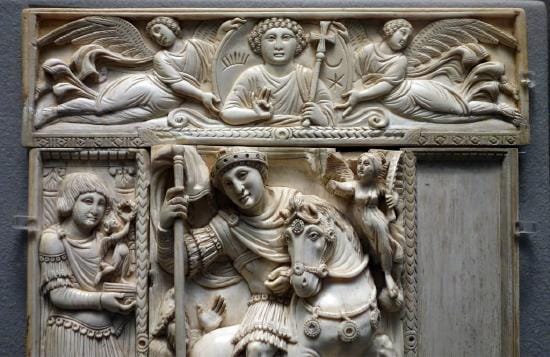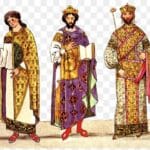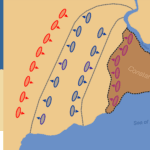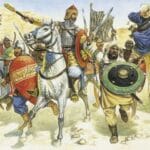Have you ever heard of Justinian? He was, um, a really ambitious ruler from a long time ago. He, well, he wanted to make the Roman Empire great again. So, he, uh, tried to conquer a lot of land. In this article, we’ll, like, explore Justinian’s plans, his accomplishments, and, you know, how he changed the world.
Justinian as World Conqueror
Justinian, the Byzantine Emperor who ruled from 527 to 565 AD, had, well, big dreams. He wanted to bring back the Roman Empire, the one that stretched all the way from Spain to Syria. With this goal in mind, he started campaigns to get back the western part of the empire, which is why some people called him “Justinian, the World Conqueror.”
His armies, led by talented generals like Belisarius, took over North Africa, defeating the Vandal Kingdom and making those lands part of the Roman Empire again. This victory probably made Justinian even more determined, and he then focused on Italy, which was, like, the center of the old Western Roman Empire.
The Ostrogoths, who were in control of Italy at the time, fought back hard. The war went on for years, with both sides winning and losing battles. Finally, Justinian’s forces won, bringing Italy back under the emperor’s control.
Justinian didn’t just want to conquer land, though. He believed he was meant to bring the Roman world back together. He paid for the rebuilding of damaged cities, made the government run more smoothly, and had amazing buildings built, like the Hagia Sophia in Constantinople.
But all these wars and projects cost a lot of money, and the Byzantine treasury was feeling the strain. The empire, which was fighting on multiple fronts, became more vulnerable to attacks, especially from the east.
Even though there were challenges, Justinian’s reign was important. He changed Roman law with the Justinian Code, which is still admired today. He also managed to bring the Mediterranean region back under Roman control, even if it didn’t last.
So, was Justinian really a “World Conqueror”? It’s hard to say for sure. He didn’t completely bring back the Roman Empire, but he was a very ambitious ruler who had a big impact on history.
The Rise of Justinian: From Humble Beginnings to Emperor
Justinian’s story is pretty surprising. He wasn’t born into a powerful family. He was just a farmer’s son. But he was smart and ambitious, and he became Emperor in 527. He decided he was going to make the Roman Empire powerful again.
He started by making the government work better. Justinian knew that a strong empire needed to be well-organized. He made sure everyone knew who was in charge and simplified how things were run. He even tried to make the paperwork less complicated. These changes helped the empire become more stable.
Justinian was also really interested in law. He created a collection of legal writings called the Corpus Juris Civilis. He basically took all of Roman law and organized it in a way that people still find impressive. It’s like the ultimate guide to Roman law, and it influenced law books all over Europe.
Justinian was also a big supporter of the arts. During his reign, Constantinople became a major center of culture. The Hagia Sophia, this incredibly beautiful building, was just one of many amazing structures built during his time. Justinian genuinely cared about art and culture, and he made Constantinople an exciting place to be.
Justinian also wanted to expand the empire. He launched military campaigns and took back land in North Africa and Italy, which made the Byzantine Empire a major power again.
Of course, there were challenges during Justinian’s reign. The empire suffered from a terrible plague, and there were arguments about religion. But Justinian found ways to deal with these problems, using his political skills and ability to negotiate.
Justinian was a complex figure. He was a strong leader who made the Byzantine Empire stronger, but some people think he tried to do too much with all of his conquests. But one thing is certain: Justinian left his mark on history. He showed that even someone from a humble background can rise to power and change the world.
Justinian’s Military Campaigns: A Quest for Lost Glory
Key Takeaways:
- Justinian wanted to make the Roman Empire great again, and conquering Italy was part of his plan.
- The campaigns, led by Belisarius and Narses, had ups and downs.
- The reconquest had a lasting impact on Italy, the Byzantine Empire, and Western Europe.
Justinian, the emperor of the Byzantine Empire from 527 to 565 CE, had a big vision. He wanted to bring back the glory of the Roman Empire. He believed that a strong military was the way to do this.
Military Campaigns Under Justinian’s Reign
Justinian is most famous for his military campaigns to retake Italy and North Africa. He put two of his best generals, Belisarius and Narses, in charge of these campaigns.
Belisarius was a brilliant military strategist. He won several victories against the Ostrogoths, who had controlled Italy since the fall of the Western Roman Empire in 476 CE. In 535 CE, Belisarius marched into Rome, making it part of the Byzantine Empire again.
Narses, another skilled military leader, finished the conquest of Italy in 553 CE. He defeated the Ostrogoths at the Battle of Taginae, where he defeated their king, Totila. This was a turning point in the war.
Justinian’s reconquest of Italy was a major accomplishment, but it came at a cost. The campaigns went on for more than twenty years and used up a lot of the Byzantine Empire’s resources.
The Enduring Legacy of Justinian’s Military Campaigns
Justinian’s reconquest of Italy had a major impact on Italy, the Byzantine Empire, and all of Western Europe.
The reconquest did bring Italy back under Byzantine control, but it also weakened the Ostrogothic kingdom, which paved the way for the Lombards to take over a large part of Italy in the 6th century CE.
The Byzantine Empire became stronger after the reconquest and was recognized as a major world power. Its territory now went from the Adriatic Sea all the way to the Euphrates River.
The reconquest had a big impact on Western Europe because it helped preserve Roman culture and law in a region that would eventually become very important to Western civilization.
The Code of Justinian: A Legacy of Law and Order
Imagine trying to make sense of laws that were made over hundreds of years, with some of them even carved on stone tablets! This was the situation in the Byzantine Empire before Emperor Justinian decided to do something about it. He created the Code of Justinian, a massive project that brought order to the legal system and influenced Western law as we know it.
Justinian brought together his best legal experts and gave them a huge job: to collect every single law and legal opinion from Rome’s entire history. They spent years going through countless documents, figuring out what they meant, and creating a comprehensive legal system that would become the foundation of his empire.
The code wasn’t just a bunch of old laws, though. It reflected Justinian’s goals and beliefs. He wanted to bring back the Roman Empire, and you can see that in the way he incorporated Roman legal traditions into the code. But the code also shows us the influence of Justinian’s own time period and the growing importance of Christianity.
Justinian wasn’t just a powerful emperor who expanded his territory. He also cared about justice and order, and he showed that with the Code of Justinian. This code was highly influential in Europe for centuries and helped shape the legal systems we have today.
- Unlock Water’s Symbolism: A Cross-Cultural Exploration - April 20, 2025
- Identify Black and White Snakes: Venomous or Harmless? - April 20, 2025
- Unlocking Potential: Origins High School’s NYC Story - April 20, 2025















